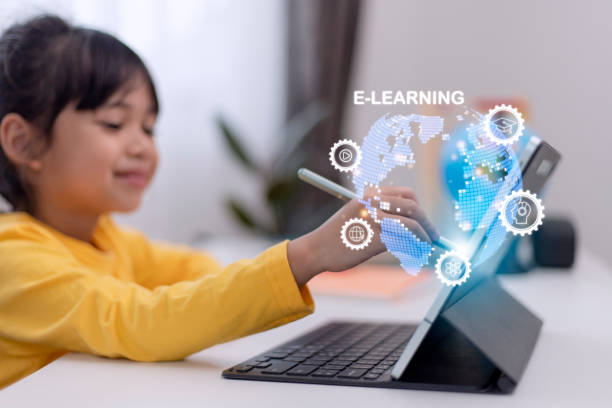Table of Contents:
- Benefits of Online Learning for Young Students
- Potential Challenges and How to Overcome Them
- Tools and Resources for Successful Remote Education
- Parental Involvement in Online Learning
- The Role of Teachers in an Online Environment
- Future Trends in Online Elementary Education
Online education revolutionizes elementary education by providing interactive lessons, multimedia resources, and personalized instruction tailored to each child’s pace and learning style. This shift promotes flexibility for families and the early development of tech literacy and self-directed learning skills. It also opens up innovative teaching methods beyond traditional classrooms. As technology advances, online education is expected to be crucial in shaping elementary students’ learning, growth, and success in a connected world.
The educational landscape is no stranger to change, and the emergence of online elementary education is a testament to how technology is redefining learning paradigms. The demand for flexible, accessible learning models has led many parents and educators to explore online education as a viable alternative to traditional classrooms. In these virtual environments, students are offered a structured curriculum that adheres to educational standards while allowing them to study from home. This flexibility is key for families seeking to balance diverse needs, such as travel, extracurricular commitments, or individualized learning paces.
It’s helpful for families looking to understand how online public elementary schools operate and what they can offer to learn more about their structure and benefits. By doing this, parents are better equipped to choose the educational pathways that are most appropriate for their kids. As they continue improving, online learning programs progressively integrate social and emotional development and academic advancement. In the end, online primary education provides a progressive means of addressing the requirements of families and promoting student achievement.
Benefits of Online Learning for Young Students
Fostering a customized approach to education is one of the main benefits of online learning. Unlike the one-size-fits-all model often prevalent in traditional classrooms, online learning allows students to progress at their own pace. This can be incredibly beneficial for those who either grasp concepts quickly or require more time to understand new material. Additionally, online learning settings significantly increase students’ digital literacy, organically incorporating technology into their everyday lives. These abilities are crucial in today’s technologically advanced world and help students prepare for future demands in both their academic and professional lives.
Moreover, online formats can facilitate a more holistic educational experience by drawing on various digital tools and resources. These resources can include virtual simulations, engaging multimedia content, and access to global perspectives, all of which contribute to a richer learning experience.
Potential Challenges and How to Overcome Them
Despite its many benefits, online elementary education is not without its challenges. A common concern among parents and educators revolves around a potential decrease in student social interactions. Building social skills and a feeling of community requires interaction with instructors and peers. To address this, parents and educators can incorporate social activities like virtual study groups or online clubs into the learning schedule.
Screen time is another challenge that requires careful management. Creating a balanced schedule with designated breaks and ensuring screen-free time for physical activities can help alleviate any adverse effects. Parents can support their children by participating in these breaks, perhaps through joint outdoor activities.
Tools and Resources for Successful Remote Education
Achieving successful outcomes in online education necessitates using specialized tools and resources. Learning management systems (LMS) are pivotal in organizing coursework and facilitating communication between students and teachers. They also allow educators to track progress and adjust lesson plans to meet student needs better. In addition to LMS, many educational apps can make learning more engaging and interactive.
Security is paramount in any online environment. Implementing digital safety measures, such as using secure passwords and enabling parental controls, ensures a safe learning atmosphere. Parents should educate their children about the importance of online privacy and responsible internet use to bolster these security measures.
Parental Involvement in Online Learning
Parents play a crucial role in their children’s online education journey. Their involvement goes beyond assisting with schoolwork; it’s about creating a supportive learning environment. This involves setting up a structured routine, designating specific areas for study, and fostering an atmosphere conducive to concentration and learning. Parents are encouraged to maintain open lines of communication with teachers to keep track of their child’s educational progress and address any concerns promptly.
Furthermore, encouraging breaks and physical exercise can help maintain a healthy lifestyle, thus ensuring that children receive a balanced education that nurtures their academic growth and well-being.
The Role of Teachers in an Online Environment
Teachers have become facilitators of knowledge in the digital realm, adapting traditional methods to suit online formats. Their ability to engage students through diverse teaching methods, such as live sessions, quizzes, and interactive discussions, is crucial for success in these environments. Teachers are also responsible for utilizing various digital tools to deliver content effectively and ensure students remain motivated and focused.
This shift has also required teachers to develop new skills for managing and integrating technology into their teaching, which is a key component in fostering compelling online learning experiences.
Future Trends in Online Elementary Education
The future of online elementary education is rife with potential and innovation. As technology continues to evolve, so will the tools available for online education. Emerging technologies like artificial intelligence (AI) and virtual reality (VR) could revolutionize how subjects are taught by providing more immersive and interactive learning experiences.
Furthermore, educational systems are likely to adapt by blending online methodologies with traditional approaches, creating hybrid models that capitalize on the strengths of both worlds.

